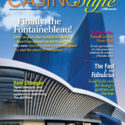“May you livein interesting times.”
-Ancient Chinese proverb
The volatility of the financial markets has led to interesting times indeed for borrowers, investors and Wall Street. The good news is that a broader segment of the market is willing to take on risk, and we’re now seeing a number of financings proceed to closing.
In a credit crunch, lenders stop lending and credit becomes difficult to obtain. In the current crunch, the market discounted or sold off everything from weak, deeply indebted companies to over-extended lenders to over-leveraged consumers. Various surveys indicate that our economy is in a recession; however, economic data suggests that we’re not there quite yet.
Is Gaming Recession-proof?
The gaming industry, long considered recession-proof, has now shown unprecedented softness in nearly all markets across the United States, including southern Nevada. This consumer-led recession is causing lighter discretionary spending, which has a direct impact on gaming revenues. Overall, monthly reports indicate that most gaming markets are down 10 percent to 15 percent in a year-over-year comparison.
Impact on Capital Markets
As weaker macroeconomic conditions persist, softer credit fundamentals and constrained liquidity has pushed up default rates. Correspondingly, these risks have weighed heavily on the capital markets. Market performance has suffered as a result of highly leveraged capital structures and weak structural protections.
It didn’t happen overnight. Due to declining structural protections and other aggressive features of new deals brought to market in recent years, risk in the leveraged loan market had in fact been building for some time.
The abundance of loans originated to fund shareholder-oriented activities (like leveraged buyouts or LBOs and covenant-light and second-lien loans) was a part of this trend. The massive overhang of approximately $150 billion in the leveraged loan market has been met by anemic demand from investors. Thanks to the Federal Reserve, liquidity has returned to the market; Wall Street firms and investors have shown a willingness to take on risk, if slowly and at high return thresholds.
The secondary trading levels of debt securities (high yield bonds) for gaming-related borrowers have declined meaningfully, approximately 8 percent to 10 percent since early January. This technical market correction has resulted in a meaningful increase in the borrowing costs for all gaming operators, both commercial and Native American.
Deal Activity in the Gaming Industry
With continued weak demand in the leveraged loan market, Wall Street debt arrangers trying to close transactions have had their work cut out for them. Harrah’s Entertainment saw its deals flounder in the market as the massive debt used to finance the company’s going-private transaction couldn’t be sold by Street underwriters. Ultimately, large amounts of Harrah’s debt were sold at discounted levels; however, a meaningful part of this debt remains on Wall Street’s balance sheet. Yields on the Harrah’s bonds were priced at a discount to yield 13 percent.
According to Loan Pricing Corporation, there were a total of 10 of gaming financings valued at approximately $19.5 billion completed through April 2008. Given the complexion in the market, the only ones completed were those that had to be, because the opportunity costs of “not closing that merger” or “breaking ground on that casino development” were too high. The owners of those borrowers could bear the higher cost of financing because their overall returns exceeded the incremental borrowing costs resulting from the credit crunch.
Market Liquidity
In early 2008, credit market investor appetite for new financings was sparse. The most active players in the credit market during this period were hedge funds managers who funded transactions as club deals. The traditional high yield bond market was effectively unavailable to borrowers.
But a combination of the Federal Reserve’s continued easing, creative stimulus packages and wide investor yields have brought a broader base of investors off the sidelines to begin participating in deals.
We’re now seeing a slight opening in the high yield bond market to certain issuers, albeit at higher borrowing costs. Given the balance sheet issues of the commercial banks (LBO bridge loans, sub-prime and derivative write-downs) we continue to see minimal capital commitments from Wall Street banks related to gaming development financings. That, too, will change at a slow pace as banks shore up their balance sheets and raise capital for the next economic cycle.
Notable Gaming Financings 2008
Besides the Harrah’s LBO financing, the most notable gaming financings thus far in 2008 are the $340 million Firekeepers Development Authority (Native American casino development in Grand Rapids, Michigan) and the $720 million PITG Gaming (commercial casino development in Pittsburgh, Pennsylvania).
Both transactions were “greenfield” financings that had little to no equity in the capital structure and no corporate backstop. The result is that both projects will likely get financed at higher borrowing costs.
- Firekeeper’s $340 million 144A senior secured notes priced at 13.875 percent at a 96 discount. In what is believed to be the first Native American high yield bond financing in 2008, this transaction was met with solid interest and was meaningfully oversubscribed. Full House Resorts is the management company for this casino development.
- PITG’s $720 million credit facility (which had not closed at press time) was split into $100 million revolver, $380 million first lien and $260 million second lien facilities. The sponsor of PITG is Don Barden, a Detroit businessman who won the license to operate a casino in downtown Pittsburgh in a highly competitive selection process.
While Barden had intended not to invest any equity in this financing, the debt markets forced him to provide a $35 million completion guarantee whose proceeds are being pledged from the sale of the Fitzgerald’s Las Vegas property, which Barden owned personally.
It should also be noted that credit market investors were extracting equity warrants in connection with the second lien tranche. Overall, this financing was a highly aggressive structure to be contemplated in the current market environment.
Access to the Capital Markets Going Forward
It is our expectation that the capital markets will become modestly more aggressive as we work our way through 2008. A moderate increase in investor liquidity will drive more aggressive structures and lower market pricing.
However, borrowers should not expect pricing to return to the pre-credit crunch levels of 2007. In our view, it could be several years before we see deal-pricing levels return to that level of aggressiveness.
In the near-term-or until there is a significant increase in market liquidity-borrowers should expect that hedge funds will continue to drive the pricing on financings, which means higher costs of capital, tighter covenant packages and more conservative capital structures.
Given the choppiness of the market, we recommend that clients proceed carefully, get their ducks in a row on development plans and hire skilled financial advisors to help them navigate this period of uncertainty.
Remember, if you have a quality gaming development project, the market can and will finance a good project, albeit at higher borrowing costs when compared to those of the last few years.








